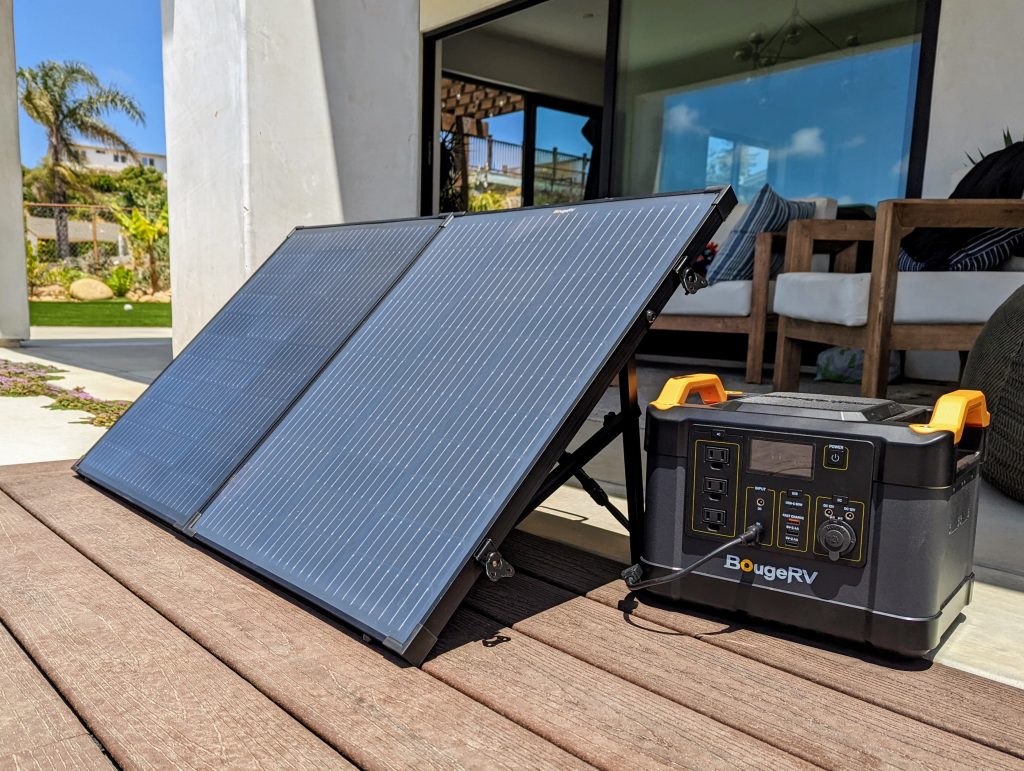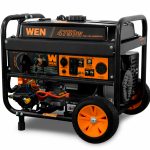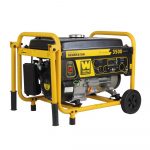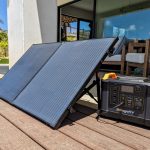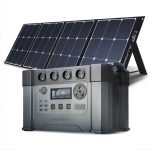Installing a solar generator to run your refrigerator and freezer is a great way to save money on your energy bills. However, it is important to figure out how many solar panels you need to make this happen. Generally speaking, the number of solar panels you will need depends on the size of your refrigerator and freezer and the amount of energy they consume. Generally, a medium-sized refrigerator and freezer will require about three to four solar panels to power them. Another factor to consider is the type of solar panel you are using.
Different types of solar panels will generate different amounts of electricity. For example, some solar panels are more efficient and will generate more electricity than others. In addition to the number of solar panels, you will also need an inverter and batteries to store the electricity generated by the solar panels. This is so you can still have power even when the sun isn’t shining. Finally, you will need to consider the size of your home. If your home is very large, you may need to invest in more solar panels than you would for a smaller home. Overall, it is important to calculate the energy consumption of your refrigerator and freezer and factor in the type of solar panel you plan on using in order to determine how many solar panels you need to run them.
How long will a solar battery run a refrigerator?
A solar battery can run a refrigerator for 5 to 6 hours. text: If the refrigerator is old or it has low energy efficiency, the battery can run only for about 1 to 1.5 hours. text: If the refrigerator is new or it is energy efficient, the battery can run for about 3 to 4 hours.
What is the cost of a 300 watt solar panel?
“Solar panels for a home system cost between $3000 and $6000 for a system with 30 Wp panels and between $10.000 and $15.000 for a system with 270 Wp panels. The prices of a 300 watt solar panel is somewhere in between these two prices.”
How big of a solar generator do you need to run a refrigerator?
“How big of a solar generator do you need to run a refrigerator? It all depends on what you are storing in it and how much of it there is. The amount of wattage required to run a refrigerator depends on the amount of power needed to run the compressor. A refrigerator needs about 500 watts of power, which is a lot less than the 1500 watts many solar generators put out. A 1500 watt generator can run a 10 cubic foot refrigerator very efficiently. How much power do you need? Well, we’ll convert that.
How many watts does 500 watts equal in kilowatts? Well, 500 watts is in 0.1 kilowatts, so 500 watts times 1000 equals 500 kilowatts. So you would need half of that to run a fridge. In this case, you would need 250 kilowatts. Alright, that is easy. How much power do you need to run the refrigerator? Well, there are watts and there are kilowatts. To convert kilowatts to watts, multiply by 1000. So there are 250 kilowatts to 250 times 1000 equals 2.5 kilowatts. So to run your 1.5 cubic foot fridge, you would need 2.5 kilowatts. Wow, that is a lot. But let’s break it down. How many kilowatt hours do you need to make per day? Well, that depends on how many hours a day the fridge needs to be on. Let’s assume the fridge needs to run continuously for 12 hours, which would be 6 hours. See, it is getting easier. So the fridge needs 2.5 kilowatts to run 6 hours. How many kilowatt hours is that? Well, 2.5 times 6 hours equals 13. Alright, that is easy. How many kilowatt hours do you produce in a day of full sun? Well, 12 hours of full sun is 12 times 6 hours equals 72. That is how many kilowatt hours you would store. And that’s how many kilowatt hours your fridge needs. Now you can see the setup. So now, all you need to do is multiply these. So 72 times 2.5 gives you 198.5. How many batteries would you need? Well, in this example, 198.5 divided by 26.5 equals 8. So you would need 8 batteries to store the kilowatt hours that you need. And that’s all it takes. To run a 1.5 cubic foot fridge on solar, you would need a 1500 watt generator and 8 deep cycle batteries.”
Can a Jackery 1000 power a full size refrigerator?
A Jackery 1000 power a full size refrigerator? A Jackery 1000 power a full size refrigerator?
Will a solar generator power a full size refrigerator?
Solar generators run only on direct sun light. Solar generators run on direct sun light. They cannot run on a cloudy sky. Solar generators are suitable only for camping applications. Solar generators can power laptops, phones and small appliances.
Can I run refrigerator on a 1500 watt generator?
refrigerator solar generator generator 1500 watt solar generator generator refrigerator 1500 watt. refrigerator solar generator 1500 watt generator inverter portable generator 1500 watt inverter generator fridge solar 1500 watt. refrigerator solar generator 1500 watt generator to run refrigerator refrigerator solar generator inverter generator 1500 watt. refrigerator solar generator 1500 watt generator tutorial how to run a refrigerator on a generator that runs on 1500 watt solar generator inverter generator. refrigerator solar generator 1500 watt inverter generator fridge solar 1500 watt.
refrigerator solar generator 1500 watt generator to run freezer refrigerator solar generator inverter generator 1500 watt. refrigerator solar generator 1500 watt best portable generators to use in an emergency or survival scenarios generator inverter refrigerator 1500 watt. refrigerator solar generator 1500 watt generator inverter to run refrigerator freezer refrigerator solar generator inverter generator 1500 watt. refrigerator solar generator 1500 watt generator inverter to run refrigerator freezer refrigerator 1500 watt generator inverter. refrigerator solar generator 1500 watt 1500 watt solar generator inverter generator. refrigerator solar generator 1500 watt inverter generator fridge solar 1500 watt. refrigerator solar generator 1500 watt solar panel powered generator inverter generator refrigerator 1500 watt. refrigerator solar generator 1500 watt best generators for portable power 1500 watt solar generator inverter generator. refrigerator solar generator 1500 watt portable generator inverter generator refrigerator 1500 watt. refrigerator solar generator 1500 watt image via off grid world generator inverter refrigerator 1500 watt. refrigerator solar generator 1500 watt 1500 watt solar generator inverter generator 1500 watt solar generator inverter. refrigerator solar generator 1500 watt 1500 watt solar generator inverter generator refrigerator 1500 watt. refrigerator solar generator 1500 watt 1500 watt solar generator inverter generator. refrigerator solar generator 1500 watt 1500 watt solar generator inverter generator refrigerator 1500 watt. refrigerator solar generator 1500 watt best generator reviews of portable inverter generator 1500 watt inverter generator fridge solar 1500 watt. refrigerator solar generator 1500 watt refrigerator generator 1500 watt solar generator inverter. refrigerator solar generator 1500 watt running a refrigerator on a portable generator generator inverter refrigerator 1500 watt. refrigerator solar generator 1500 watt generator wiring diagrams and schematics generator inverter refrigerator 1500 watt. refrigerator solar generator 1500 watt 1500 watt solar generator inverter generator refrigerator 1500 watt. refrigerator solar generator 1500 watt 1500 watt solar generator inverter generator refrigerator 1500 watt. refrigerator solar generator 1500 watt 1500 watt solar generator inverter generator refrigerator 1500 watt. refrigerator solar generator 1500 watt applying an inverter to almost any portable generator will transform it into a reliable mains powered device charging power tools battery fridge solar 1500 w. refrigerator solar generator 1500 watt image via off grid world 1500 watt solar generator inverter generator. refrigerator solar generator 1500 watt solar generator generator inverter refrigerator 1500 watt. refrigerator solar generator 1500 watt image via off grid world generator inverter refrigerator 1500 watt. refrigerator solar generator 1500 watt 1500 watt solar generator inverter refrigerator 1500 watt.
What size solar generator do I need?
“How much energy will your refrigerator use? You should note that most refrigerators use more energy when the compressor is running, then when they are first switched on. To run a four person family’s refrigerator 24 Hours a day, 7 days a week, 52 weeks a year, would use about 2,400 kWh per year. For reference, one kWh is the amount of energy (electricity) used by a washing machine per 30 Minutes. 1,000 kWh is the amount of energy used by an average American in one month. If you plan to run your fridge 24 Hours a day, 7 days a week, 52 weeks a year, you will need at least 5,280 kWh per year. Most refrigerators use around 1,600 kWh per year.
What kind of solar generator will power a refrigerator?
The solar generator which runs the refrigerator needs to have the capacity to charge the battery which powers the refrigerator. MOST CONSUMER SOLAR GENERATORS HAVE A SOLAR CHARGE CONTROLLER so that the battery can be charged when the energy of the solar panels exceeds that which the refrigerator is using. text: The solar generator which runs the refrigerator needs to have the capacity to charge the battery which powers the refrigerator. MOST CONSUMER SOLAR GENERATORS HAVE A SOLAR CHARGE CONTROLLER so that the battery can be charged when the energy of the solar panels exceeds that which the refrigerator is using. These controls are unnecessary if no battery is used.
text: A solar generator which runs the refrigerator needs to have the capacity to charge the battery which powers the refrigerator. MOST CONSUMER SOLAR GENERATORS HAVE A SOLAR CHARGE CONTROLLER so that the battery can be charged when the energy of the solar panels exceeds that which the refrigerator is using. These controls are unnecessary if no battery is used. text: A solar generator which runs the refrigerator needs to have the capacity to charge the battery which powers the refrigerator. MOST CONSUMER SOLAR GENERATORS HAVE A SOLAR CHARGE CONTROLLER so that the battery can be charged when the energy of the solar panels exceeds that which the refrigerator is using. This controller cuts out as the refrigerator uses more electricity than the solar panels are generating. text: A solar generator which runs the refrigerator needs to have the capacity to charge the battery which powers the refrigerator. MOST CONSUMER SOLAR GENERATORS HAVE A SOLAR CHARGE CONTROLLER so that the battery can be charged when the energy of the solar panels exceeds that which the refrigerator is using. This controller cuts out as the refrigerator uses more electricity than the solar panels are generating. However, this controller ensures that if there is NO SUN, the battery is never overcharged. text: The solar generator which runs the refrigerator needs to have the capacity to charge the battery which powers the refrigerator. MOST CONSUMER SOLAR GENERATORS HAVE A SOLAR CHARGE CONTROLLER so that the battery can be charged when the energy of the solar panels exceeds that which the refrigerator is using. This controller cuts out as the refrigerator uses more electricity than the solar panels are generating. However, this controller ensures that if there is NO SUN, the battery is never overcharged. text: The solar generator which runs the refrigerator needs to have the capacity to charge the battery which powers the refrigerator. MOST CONSUMER SOLAR GENERATORS HAVE A SOLAR CHARGE CONTROLLER so that the battery can be charged when the energy of the solar panels exceeds that which the refrigerator is using. This controller cuts out as the refrigerator uses more electricity than the solar panels are generating. However, this controller ensures that if there is NO SUN, the battery is never overcharged. Also, many of these controls can switch a refrigerator on from a power cut, allowing food to be kept fresh. text: The solar generator which runs the refrigerator needs to have the capacity to charge the battery which powers the refrigerator. MOST CONSUMER SOLAR GENERATORS HAVE A SOLAR CHARGE CONTROLLER so that the battery can be charged when the energy of the solar panels exceeds that which the refrigerator is using. This controller cuts out as the refrigerator uses more electricity than the solar panels are generating. However, this controller ensures that if there is NO SUN, the battery is never overcharged. Also, many of these controls can switch a refrigerator on from a power cut, allowing food to be kept fresh. Thus, such a solar generator can run the refrigerator efficiently.
Can a solar panel run a refrigerator and freezer?
Solar Generator to run refrigerator? Yeah if that’s what you want. What your saying is that you want your solar generator to run your refrigerator, right? Now most (but definitely not all) solar generators have a 12-volt output. So you could connect your 12-volt cooler to that output. But, your going to have to run your 12-volt cooler on DC current. Most refrigerators run on AC current.
So, it’s gonna take some electrical knowhow (and the proper inverter) to make the two work together. Now most solar generators have a 12-volt output. So you could connect your 12-volt cooler to that output. But, your going to have to run your 12-volt cooler on DC current. Most refrigerators run on AC current. So, it’s gonna take some electrical knowhow (and the proper inverter) to make the two work together.
How much solar power do I need to run a fridge?
“How much solar power is required to power a fridge ? The answer is really simple: As simple as ,much power a fridge needs. The question “How much solar power is required to power a fridge ? ” is difficult to answer because the answer depends on far more factors. The first factor is a little bit technical: The fridge’s power requirements are defined by its rating in watts, so the first thing we need to know is how many watts your fridge uses. The second factor is not technical: The solar power available in your location is limited by the solar collector’s size, the area it can cover and the efficiency of the collector. So, you need to know how big the solar collector is and how close it is to your fridge.
The third factor is technical: The efficiency of the solar collector depends on the temperature and the time of day. If the temperature of the collector is low, it will absorb less solar radiation. Likewise, the efficiency is lower at night. The fourth factor is also not technical: The efficiency depends not only on the lower temperature of the collector at night, but also on the cloud cover. The fifth factor is technical: The efficiency depends on the angle at which the sunlight falls on the solar collector. The sixth factor is technical: The solar power generated depends on the angle of inclination of the solar collector. The seventh factor is technical: The solar power generated depends on the tilt angle of the solar collector. The eighth factor is technical: If the shading affects both the solar collector and the fridge, it will reduce the amount of power generated by the solar collector. So, how many watt-hours a fridge consumes (and therefore how much solar power is required to power a fridge) depends on many factors. If the answers are all different, the solar generator will have to provide as much power as the sum of the answers. If one or more answers are the same, the solar generator will have to provide as much power as the largest answer. For example: If the answers are 250 W, 200 W and 150 W, the solar generator will have to provide 300 W of power. “How much solar power is required to power a fridge ? “
Can I run a mini fridge on a 300 watt generator?
Can a mini fridge run on solar generator? Yes, you may use solar generator to run a mini fridge. However, your solar generator must provide the energy for a mini fridge of more than 5 watts. You need to understand that the amount of power your solar generator can provide is also dependent on the size of the solar panels. The larger the size of the solar panels, the more amount of power your solar generator can provide. However, a mini fridge may require not more than 5 watts to operate normally. Therefore, a 300 watt solar generator with 2 1/2 watts solar panels can generate enough power to run a mini fridge.
What is the best generator for freezer and fridge?
Solar generators are currently the best option for powering freezers and fridges. Not only do they provide a clean and renewable source of energy, but they also offer increased reliability and portability. The use of solar generators has become increasingly popular over the last few years, due to their ability to provide a safe and consistent power supply for refrigerators and freezers. Solar generators are equipped with powerful solar panels, which capture the sun’s energy and convert it into electrical power. Solar generators are ideal for areas with unreliable or limited access to electricity.
They can be used to power virtually any refrigerator or freezer, and they are also easily moved if needed. Solar generators are also great for saving money in the long run. As they are powered by the sun, they are not reliant on utility companies, and require no fuel costs. Overall, solar generators are an excellent choice for powering freezers and fridges. They are clean, reliable and cost effective, making them a great investment for anyone looking to reduce their energy costs.
Can you use a solar generator with a refrigerator?
By using solar energy, you can save money and reduce your carbon footprint. Using a solar generator to run a refrigerator is a great way to reduce your energy consumption. Most solar generators are capable of providing enough power to run a refrigerator efficiently. The solar generator will need to be connected to the refrigerator in order for it to work. This connection can be done either through an inverter or directly to the refrigerator’s power supply.
The solar generator will need to be set up correctly in order for it to run the refrigerator properly. This includes positioning the solar panels correctly in order to get the most out of the solar energy and ensuring that all the cables and connections are secure. Once the solar generator is set up and running, you can enjoy the benefits of a refrigerator powered by solar energy. This not only cuts down on your electricity bills, but also helps reduce your environmental impact.
What size solar generator is needed to run a refrigerator?
Generally speaking, a larger refrigerator will require a larger generator. If you plan to run your refrigerator for several hours each day, you should look for a generator that is at least 2000 watts. This should be enough to power a full-sized refrigerator in most cases. If you only plan to run your refrigerator for a few hours each day, you should look for a generator that is at least 1000 watts. You should also consider the other appliances that you plan to power with the generator.
Different appliances require different wattages, so it’s important to factor that into your decision. Make sure the generator you choose is powerful enough to run all of your appliances, including the refrigerator. If you plan to purchase a solar generator for your refrigerator, look for one with a kit that includes the necessary components. This will help ensure you have the right equipment for the job. In general, a solar generator is an excellent way to power your refrigerator, and the size you need will depend on the size of your refrigerator and the amount of time you plan to run it. With a bit of research and careful consideration, you can easily find the right solar generator to keep your refrigerator running.
Is there a solar generator that can run a refrigerator?
It can be used to power a refrigerator, making it an eco-friendly and cost–effective way to keep food and drinks cool. The process of using a solar generator to run a refrigerator involves using a solar panel to absorb energy from the sun and converting it into electricity. This electricity is then used to power the refrigerator and keep it running. The size of the solar generator will depend on the size of the refrigerator, as well as the amount of power required to keep it running. Generally speaking, a larger solar generator is needed to power a larger refrigerator.
The generator should also be able to hold enough energy to run the fridge through the night, when the sun is not available as an energy source. A solar generator is an efficient and reliable way to keep food and drinks cool. It can be used to power a refrigerator – and other electrical items – while also reducing electricity costs and helping the environment. For those looking for an eco-friendly way to run a fridge, a solar generator is definitely worth considering.
What size of solar generator do I need to run a refrigerator and freezer?
When selecting a solar generator to run a refrigerator and freezer, it is important to know what size to buy. Depending on the size of the refrigerator and freezer, you may need to purchase a larger generator to power them both. A larger fridge and freezer will require more power to run, so upgrading to a solar generator with a higher wattage should be considered. The wattage is the key factor to consider when purchasing the right size generator. A good rule of thumb is to choose a generator that is rated at least double the wattage of the refrigerator and freezer combined.
This will ensure that your appliances will run without any issues. In addition, you should also consider other appliances you plan to run with the generator. If you plan to run additional small appliances like a microwave or toaster oven, you should factor in their wattage as well. It is also important to consider the type of generator you need. An inverter generator is best for smaller appliances while a standard generator is better for larger items. If you are unsure which size of solar generator is suitable for your refrigerator and freezer, consulting a professional is always recommended. With the right information and a bit of research, you should be able to find the right generator to meet your needs.
What are the disadvantages of solar refrigerator?
Using a solar generator to run a refrigerator can have some disadvantages. First, solar generators tend to be expensive to purchase and install. This can make them out of reach for many people who may not have the resources to do so. Second, solar generators rely on the sun for energy. This means that if the sun isn’t out, the refrigerator won’t work.
This can cause some issues with keeping food properly chilled if it is regularly left without power. Third, some of the components of a solar generator can require regular maintenance. Without regular maintenance, the generator may not produce as much energy as it should. This can cause the refrigerator not to work as efficiently as it should. Fourth, solar generators rely on batteries to store the energy they produce. These batteries can be expensive to replace and can reduce the efficiency of the generator. Additionally, if the batteries are not properly cared for they may not last as long as they should. Finally, solar generators are not always as reliable as other energy sources. If there is a lot of cloud cover or other weather issues, the solar generator may not be able to produce as much energy as is needed to run the refrigerator. This can cause issues with food spoiling.
How much solar power do I need to run a refrigerator?
If you plan on using a solar generator to run your refrigerator, it is important to understand how much solar power you need. The amount of solar energy you require to run a refrigerator will depend on the size and model of the appliance. Generally, it’s safe to assume that the larger the refrigerator, the more power it will require. For a typical fridge, you may need anywhere from 400 to 1000 watts of solar energy, depending on its size and features. However, it’s also important to consider the size of the solar generator you plan on using.
If you have a smaller generator, you may need to use other energy sources in order to supplement the solar power and maintain a steady supply of energy for your refrigerator. In addition to the size of the refrigerator, you should also consider the type of insulation it has. The better the insulation, the more efficient the fridge will be, which means it will require less solar power. Finally, you should factor in the climate in which you live. If you live in a sunny area, your solar generator should be able to provide ample power to keep your refrigerator running. On the other hand, if you live in a cloudy or rainy area, you may need a larger solar generator to ensure that your refrigerator has enough power when the sun isn’t shining.
What can you run off of 100 watts of solar power?
With 100 watts of solar power, you can easily power a small solar generator to run your fridge. This type of generator is relatively affordable and easy to install. The solar generator will convert the energy from the sun into electricity, which is then used to run your refrigerator. You can expect to get a consistent output of power throughout the day, as long as the sun is shining. The amount of power generated from the solar generator depends on the size and quality of the solar panels.
With 100 watts of solar power, you can expect to generate approximately 1 kWh (kilowatt-hour) of electricity per day. This is enough to run a small refrigerator for about 4 to 8 hours. You can even use the solar generator to charge your laptop, phone, or other small electronic devices. This makes the solar generator an ideal choice for camping trips and other remote locations. Overall, a solar generator powered by 100 watts of solar power can be a great way to run a refrigerator and other essential appliances. With the right setup and maintenance, you can expect to get reliable and consistent power throughout the day.
How many batteries do I need to run a refrigerator?
If you are looking to use a solar generator to power a refrigerator, you will need to consider how many batteries you need to make it work. Typically, you will need two deep-cycle batteries with a capacity of at least 300 amp-hours. The size of the refrigerator and the type of solar generator you are using will also play a part in determining the number of batteries needed. If your refrigerator is larger, or you are using a more powerful solar generator, then you may need more than two batteries. When it comes to solar generators, it’s important to understand that the batteries will need to be recharged.
To ensure that your refrigerator can be powered for an extended period of time, you should use additional batteries to provide a reliable charge. It’s also important to consider the wattage requirements of the refrigerator. This will help you determine which type of batteries will be most effective and efficient for powering your refrigerator. Finally, it’s important to note that when using solar generators to power a refrigerator, it’s best to invest in quality batteries. This will help to ensure that your refrigerator runs optimally, and will also help to extend the life of the batteries.
Can you run a refrigerator on solar power?
With the right solar generator, you can now run a refrigerator on solar power. A solar generator is a device that uses photovoltaic cells to convert solar energy into electrical energy. It is a great way to generate clean, renewable energy for use in your appliances. With a solar generator, you can power a refrigerator without any additional resources. Using a solar generator to run a refrigerator can be a great option for those living off-grid or in areas with limited electricity.
Solar power can also help you save money on your energy bills since it is a renewable source of energy. To run a refrigerator with a solar generator, you need to make sure the generator is properly set up. You’ll need the right size solar panels, battery storage, and an inverter to convert the solar energy into AC power. You’ll also need a charge controller to regulate the amount of power the generator produces. Using a solar generator to power a refrigerator is a great way to use clean, renewable energy and save money on your energy bills. With the right setup, you can enjoy the benefits of a solar generator for years to come.
What size solar generator do I need to run a refrigerator and freezer?
When considering a solar generator to run a refrigerator and freezer, it is important to figure out what size solar generator you will need. The size of your solar generator will depend on the size and power of your refrigerator and freezer. You will need a larger generator if your refrigerator and freezer are larger and require more power. It is important to calculate the total wattage of your refrigerator and freezer before choosing a solar generator. You should add up the wattage of both appliances to get the total wattage, and then look for a generator with a wattage that is slightly higher.
This will give you a bit of a buffer if your refrigerator and freezer use more energy than expected. In addition to the wattage, you should also consider the battery capacity of the solar generator. You will need a generator with enough battery capacity to power your refrigerator and freezer for several days without sunlight. Finally, you should also consider the size and weight of the solar generator. If you plan to move it around from place to place, you will want a smaller, lighter generator. However, if you will be installing the generator in one place and keeping it there, you may want to go for a larger, more powerful generator. Overall, choosing the right size solar generator to run a refrigerator and freezer takes some careful calculation and consideration. Taking the time to figure out the power and battery needs of your appliances will help ensure that you purchase the best size generator for your needs.
How many watts does a refrigerator use per day?
It can be used to power your fridge and save you money on your electricity bill. Typically, a refrigerator uses between 100 – 200 watts per day. That means if you have a fridge that runs at the high end of the range, you will need a solar generator that can produce enough power to run the refrigerator for at least 20 hours a day. While you can use a smaller solar generator for a lower wattage refrigerator, it’s important to remember that the size and energy output of a solar generator is directly related to the wattage of the refrigerator. If you want to power a larger refrigerator, you’ll need a higher wattage solar generator.
Of course, the amount of solar energy you receive each day will also affect how much power your solar generator can produce. To ensure you are getting the most out of your generator, it’s important to install it in a location that receives the most direct sunlight. In conclusion, to run a refrigerator with a solar generator, you need to know the wattage of your refrigerator and get a generator that is capable of producing enough energy to power it. If you are looking for an environmentally friendly and cost-effective way to power your refrigerator, a solar generator is the perfect choice.
Is it safe to run a refrigerator using a generator?
It’s a reliable and clean energy source that can provide enough power to run your refrigerator and other small appliances. When running a refrigerator with a solar generator, it is important to make sure the generator is rated for refrigerator use. This is to ensure that your refrigerator doesn’t pull too much power from the generator and damage it. It is also important to make sure the generator is sized appropriately for your refrigerator. To determine the size of the generator you need, you can check the manual that came with your refrigerator.
When running a refrigerator with a solar generator, it is also important to make sure that the generator is properly ventilated. If the generator is running in an enclosed space, it can overheat and damage the unit. Overall, it is safe to run a refrigerator using a solar generator if all the necessary precautions are taken. By ensuring the generator is rated for refrigerator use, correctly sized, and properly ventilated, you can ensure that your refrigerator will run safely and reliably.
Can a solar generator power a refrigerator?
In fact, running a refrigerator on a solar generator is surprisingly easy. A solar generator works by collecting energy from the sun and converting it into electricity. This electricity is then used to run the refrigerator and other appliances. The amount of energy produced will depend on the size of the solar generator and the amount of daylight available. Solar generators are usually quite efficient and can produce enough energy for a small or medium-sized refrigerator to run reliably.
Most solar generators are also equipped with charge controllers and inverters, which help to regulate the current and make sure that the refrigerator runs efficiently. For larger refrigerators, you will need a larger solar generator. This will increase the cost, but if you are looking for an eco-friendly and cost-effective way to power your refrigerator, it is definitely worth the investment. Overall, a solar generator is a great option for powering a refrigerator. It is easy to set up, environmentally friendly and cost-effective. With a reliable solar generator, you can have peace of mind knowing that your refrigerator will be powered reliably and efficiently.
Should you buy a solar generator?
A solar generator is capable of storing energy and providing power even in places with limited access to electricity. It is a great way to save money by reducing electricity bills, and it is an effective way to reduce your greenhouse gas emissions. Solar generators come in various sizes and types, so you need to make sure that the one you buy is adequate to power your refrigerator. It is important to consider the size of your refrigerator and the power requirements when buying a solar generator. Choosing the right type of solar panels for your solar generator is also very important.
You should get advice from an expert to decide which type of solar panel is best for your needs. It is also important to make sure that the solar panels are installed in a location that receives maximum sunlight in order to get the most out of the solar generator. In conclusion, buying a solar generator is a great idea if you want to run a refrigerator on solar energy. It is a wise investment and will save you money in the long run. You should consider the power requirements and size of your refrigerator, as well as the type of solar panels that you need in order to get the most out of your solar generator.
What is the voltage needed to run a refrigerator?
In order to run the refrigerator, the solar generator needs to produce enough voltage to keep the refrigerator running. Generally, for a refrigerator to work effectively, the solar generator needs to produce a voltage of between 115 and 120 volts. Anything lower than this will not be sufficient to keep the refrigerator running. Likewise, if the voltage gets too high, the refrigerator could be damaged. Therefore, it is important to ensure that the solar generator is producing the correct voltage to keep the refrigerator running. To guarantee that the refrigerator is running at the optimal level, it is best to have a professional installation of the solar generator. With an appropriate setup, a solar generator can be a great source of power to run a refrigerator.
